|
|
|
This week in: Peace & Security Publications |
IPSI | Africa | Americas | East Asia | Middle East | South Asia
|
|
|
|
|
This week in Peace & Security Publications
|
|
|
|
|
Global Peace Index
The eleventh edition of the Global Peace Index (GPI), which ranks 163 independent states and territories according to their level of peacefulness. Produced by the Institute for Economics and Peace (IEP), the GPI is the world’s leading measure of global peacefulness.
|
|
|
|
|
|
|
We have recently released the daily program for the Sarajevo Symposium. You should probably take a look (it’s great)… Applications due June 15.
|
|
|
|
|
This week in Sub-Saharan Africa
|
|
|
|
|
DEMOCRATIC REPUBLIC OF CONGO: Uncertainty surrounding elections
On Saturday, President Joseph Kabila declared he did not “promise anything” about holding elections, but that he hopes to hold them as soon as possible. Elections were scheduled to take place by the end of last year with voting registrations starting a year ago. The government has justified the voting delay as a result of technical delays and lack of funds; however, the opposition accuses President Kabila of buying time to stay in power. Clashes between protesters and government forces have occurred repeatedly. Voting registrations continue in the region, with nearly a 63 percent enrollment in the conflict-inflicted provinces of Kasai. Comment: President Kabila has been in power since his father’s death in 2001. He refused to step down at the end of his final two-term mandate last December. (LePotentielOnline, Reuters, Guardian)
|
|
|
|
|
|
SOUTH AFRICA: Corruption investigation against the president
On Friday, President Joseph Zuma reshuffled 20 ministerial and deputy ministerial roles following the leak of more than 100,000 emails over the past few weeks sent to and from the Guptas, a family of Indian-South Africa business magnates. The emails have implicated members of President Zuma’s close circle in corruption scandals. Government officials and the President’s son are accused of money laundering and accepting bribes from the private sector. Comment: The re-shuffling exacerbates concerns about the President’s implication in improper dealings of government contracts. Thousands of protesters and the President’s own party, the African National Congress, have called for the President’s resignation. (DailyMaverick, IOL, EyeWitnessNews, NewsWeek)
|
|
|
|
|
SOUTH SUDAN: Government and Sudan People’s Liberation Army sign ceasefire
On Sunday, the government and a faction of the Sudan People’s Liberation Army (SPLA) signed a peace deal agreeing to a cease-fire in the South Sudan Yei River state; however, the Sudan People’s Liberation Movement-in-Opposition (SPLM-IO), the anti-government political party and rebel group, does not recognize the agreement, questioning the legitimacy of the SPLA representative. So far, the cease-fire stands. Comment: The Yei River agreement is a result of President Salva Kiir’s national dialogue initiative to bring peace and security to the country. The main opposition leader Reik Machar is still in exile. (Sudan Vision Daily 1, 2, JubaMonitor, AllAfrica, VOA News)
Researched/Written by Angelica Aimé Silfa
|
|
|
|
|
|
This week in the Americas & Caribbean
|
|
|
|
|
BRAZIL: Court opens case against Temer
On Tuesday, Brazil’s Superior Electoral Court, the Tribunal Superior Eleitoral (TSE), reopened a case on President Michel Temer’s possible use of illegal campaign donations to win the vice-presidential race in the 2014 elections. These accusations of corruption and obstruction of justice, if proven true, would render the election invalid and potentially lead to his removal from office; however, Temer has appointed two new ministers, who, along with some pre-existing members, voted on Thursday against the inclusion of new evidence, which suggests a re-orientation of the Court in the President’s favor. If Temer is removed from office, the lower house Speaker Rodrigo Maia would take over and Congress would have 30 days to elect an interim president until the next elections in late 2018. Comment: These hearings come during the country’s largest-ever corruption investigation, known as Operation Car Wash, which has implicated a third of the present cabinet and focuses on their ties to major companies such as Petrobras, Odebrecht and Lava-Jet. The numerous scandals have led to violent protests in Brasilia and around the country since March 2014 – calling for Temer’s removal and immediate elections. (O Globo, Latin America Herald Tribune, Reuters 1, 2, BBC News, The Guardian)
|
|
|
|
|
|
COLOMBIA: FARC weapons handover begins
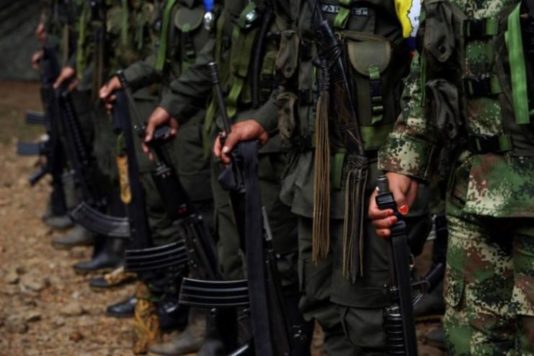 |
|
Colombia’s rebel group FARC has handed more than 30 percent of its arms to the United Nations, so far respecting their side of the Peace Agreement signed in November, 2016. In addition, the Colombian Fiscalía announced that it has so far collected a total of USD 103 million of FARC goods since the beginning of this year. The High Council for Post-Conflict told the press that this sum would be redirected toward the reparation of victims, as well as programs determined by the government. Comment: The total disarmament of the FARC has been promised to occur by June 20, 2017, and is a necessary step for the group to participate as an official party in the country’s political activity. It is part of a broader Demobilization, Disarmament, and Reintegration strategy, which is monitored by the UN Special Mission in Colombia responsible for registering and removing said weapons from the country. (El Tiempo, El Nuevo Herald, BBC News, Oxford Research Group on Sustainable Security)
|
|
|
|
|
|
VENEZUELA: Tensions rise at the OAS
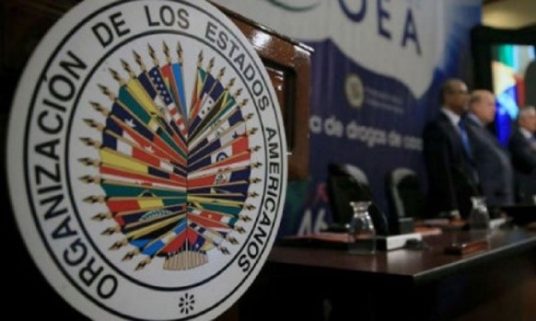 |
|
Representatives from the 34 Organization of American States (OAS) members have failed to agree on a common plan for international engagement with the Venezuelan crisis. Discussions had increased in the hopes of reaching an agreement before the next General Assembly in Mexico on June 19. Tensions between countries have been running high since Caracás was accused of human rights violations regarding the use of violence and tear gas against protesters. Although President Maduro denies these charges, Defense Minister López has demanded the military police to respect international Human Rights laws. Comment: Experts claim that the Venezuelan crisis is by far the most complicated case the OAS has had to deal with in decades. The OAS seeks to act without the consent of the Venezuelan government, which accuses it of interfering with its national affairs. The Venezuelan crisis has been described as an economic, social, democratic, and humanitarian disaster. According to Amnesty International, since April 4, clashes between protesters and police have led to at least 60 deaths, more than 1,000 wounded, and about 3,000 arrests, one-third of which are still detained. Polls show that 80 percent of the Venezuelan population is in favor of Maduro’s direct resignation. (La Nación, El Nuevo Herald 1, 2, 3, Venezuela Solidarity, BBC News, International Peace Institute, Amnesty International)
Researched/Written by Nastasia Stipo
|
|
|
|
|
|
This week in East Asia & Pacific
|
|
|
|
|
CAMBODIA: Close race in commune council elections
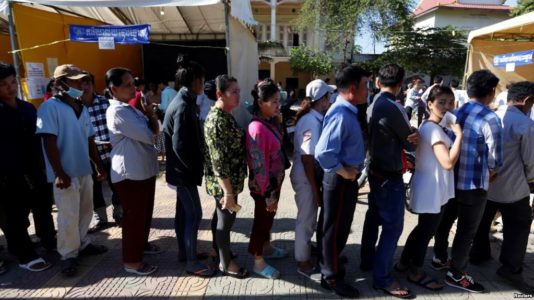 |
|
On Sunday, 89.52 percent of all voter-eligible Cambodians voted in Cambodia’s local commune council elections. Preliminary results predicted a victory for the ruling Cambodian People’s Party (CCP) headed by Prime Minister Hun Sen, securing 1,163 of 1,646 commune seats and 51 percent of the popular vote; they were followed closely by the opposing Cambodian National Rescue Party (CNRP), securing 482 seats and 46 percent of the popular vote. The official election results will be released on June 25th. Comment: Although the CCP has been the presiding party in Cambodia for three decades, the record-breaking turnout at elections and substantial gains for opposition CNRP (who won only 40 seats in the last commune election in 2012) may foreshadow a much more competitive race in Cambodia’s 2018 National Assembly General Election. The UN Office of Human Rights for South-East Asia commended Cambodia on the overall democratic and orderly execution of the election. (Channel News Asia, United Nations, Cambodia Daily, Radio Free Asia, Reuters)
|
|
|
|
|
|
CHINA: Protests commemorate Tiananmen Square
On Sunday, Hong Kong and Taiwan held large scale vigils on June 4th to commemorate the 28th anniversary of the 1989 Tiananmen Square Protests in Beijing, China. The Hong Kong vigil attracted approximately 110,000 peaceful protesters while in Taiwan, President Ing-Wen of the Democratic Progressive Party (DPP) called for China’s ruling Communist Chinese Party (CCP) to acknowledge their responsibility for the event. She offered to help China in transitioning to democracy, for which the CCP condemned him. Comment: China censors discussion of the 1989 Tiananmen Square Incident within China. The incident occurred on June 3rd and 4th, 1989 when Chinese troops were sent to quell a series of student-led, pro-democracy protests in Beijing’s Tiananmen Square, resulting in 1,600 arrests and an estimated thousands of fatalities. (Human Rights Watch, Times, Channel News Asia, Reuters)
|
|
|
|
|
|
PHILIPPINES: Countries pledge resources to help combat terrorism in southeast Asia
|
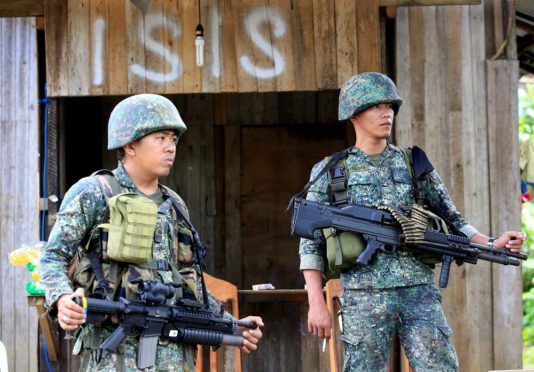 |
Last Friday through Sunday, Singapore hosted the 16th Annual Shangri-La Dialogue, a defense-security conference organized by the International Institute for Strategic Studies. During the conference, several Southeast Asian countries and the U.S. made pledges to assist the Philippines with counter-terrorism efforts against the self-proclaimed Islamic State (IS). Indonesia, Malaysia, the Philippines, and Singapore have agreed to increase joint maritime patrols and begin conducting air patrols of the Sulu Sea, beginning on June 19, to curtail the smuggling of weapons, humans, and drugs by militants. The countries have also committed to increasing intelligence sharing. Comment: IS-allied militant groups seized Marawi, the capital city of the Lanao Del Sur province on Mindanao Island, on May 23 resulting in the deaths of 138 militants, 38 government troops, and 20 civilians. The presence of foreign fighters among the combatants, as well as a terrorist attack which killed three policemen in Indonesia on May 24, raised concern among Southeast Asian governments about the growth of IS influence in Southeast Asia. (South China Morning Post, Channel News Asia, Reuters)
Researched/Written by Laura Bisbee
|
|
|
|
|
|
This week in Europe & Central Asia
|
|
|
|
|
ARMENIA/AZERBAIJAN: Tensions increase as cease-fire violations stoke Nagorno-Karabakh conflict
Russian Foreign Minister Lavrov said Tuesday that peaceful negotiations coordinated by the Russian, French, and American co-chairs of the Organization for Security and Cooperation in Europe (OSCE) Minsk Group are the only way to settle the Nagorno-Karabakh conflict following repeated violations of the 1994 ceasefire reported from both sides. The most recent violations occurred last month, when Azerbaijani forces destroyed an Armenian air defense missile system, provoking a retaliation by Armenian armed forces who fired mortars across the boundary a day later. Comment: Experts agree that tensions between the countries are at their highest since their 1994 ceasefire. (Armenia News, Armen Press, Al Jazeera, Council on Foreign Relations, RFE/RL)
|
|
|
|
|
EUROPEAN UNION: EU Commission announces sanctions against member states not meeting refugee quotas
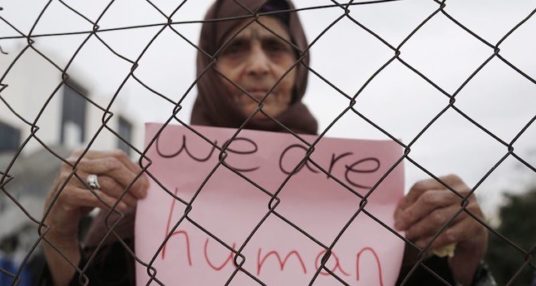 |
|
Next week, the European Commission will begin fining EU member states that do not meet their designated refugee quotas; the proposed amount of the fine is EUR 250,000 per person. The fine will be paid to those countries overburdened by refugees, such as Italy and Greece. The sanctions come to spur countries to adhere to EU rules regarding the distribution of refugees and migrants throughout the region. They are aimed particularly at Poland, who as of last Monday had not accepted a single refugee. European Commissioner for Migration and Home Affairs, Dimitris Avramopoulous, stressed that all EU members signed an agreement regarding the settlement of 160,000 total refugees throughout the EU and all would be held accountable for upholding that commitment. Comment: EU leaders have widely condemned the refusal by Poland’s Prime Minister to accept refugees and migrants due to “security concerns,” insisting every country must do their part. The EU calculates the number of refugees each country is required to admit according to that country’s population and economy. (Daily Sabah, BBC, The Australian, RT)
|
|
|
|
|
|
UNITED KINGDOM: UK Prime Minister willing to suspend human rights laws to fight extremism
On Tuesday, UK Prime Minister May announced her intentions to change human rights laws which may stand in the way of fighting terrorism. May said she intended to opt out from the European Convention on Human Rights, restrict the freedoms of terror suspects, and extend the length of time terror suspects may be held in custody without charge. May also called for longer prison sentences for convicted terrorists and laws allowing for the easier deportation of foreign suspected militants. Comment: May’s comments drew strong criticisms from members of the British Labour Party and Liberal Democrats, as well as from human rights groups around the world, including Amnesty International. The snap election resulted in the Conservatives failing to achieve a majority. May will form a “government of certainty” with the Democratic Unionists. (BBC 1, 2 The Economist, Daily Sabah, Reuters, MEMO, Telegraph
|
|
|
|
|
|
TURKEY: Police detain 23, including local chair of Amnesty International, for suspected ties to 2016 attempted coup
On Tuesday morning, Turkish police arrested Amnesty International Turkey’s local chair, Taner Kilic, along with 22 other lawyers in Izmir, on suspicion they are linked to exiled cleric Fethullah Gulen, who is accused of having orchestrated the attempted coup last year. The Turkish government says the purges and detentions of journalists, lawyers, civil servants and others are aimed at removing Gulen supporters from society, while local and international rights groups and state leaders from around the world argue that the arrests have become arbitrary. Over 100,000 people have been purged from the public sector since July 2016, many suspected by the government of having ties to what is called the Fethullahist Terrorist Organization (FETO). Comment: U.S. State Department spokeswoman Heather Nauert stated Thursday that Kilic’s detainment is the latest illustration of an alarming trend of Turkish authorities using last year’s coup as an excuse for targeting President Erdogan’s political opponents. (Hurriyet Daily News, Amnesty International, Al Jazeera, RFE/RL)
Researched/Written by Natalie A. Landau
|
|
|
|
|
This week in the Middle East & North Africa
|
|
|
|
|
IRAN: First major attacks by the self-proclaimed Islamic State on Iranian soil
On Wednesday, the self-proclaimed Islamic State claimed responsibility for twin attacks in Tehran where suicide bombers and gunmen attacked the parliament and the tomb of the revolutionary leader Ayatollah Khomeini, killing at least 12 people and injuring 42 others. The attackers were killed after four hours of intermittent gunfire. The terrorist group later released a video showing gunmen inside the parliament building and threatened more attacks. Iran’s Supreme Leader Ayatollah Ali Khamenei replied by stating, “these fireworks that happened today will have no impact on the people’s resolve.” Meanwhile, President Rouhani called terrorism a global problem that requires regional and international cooperation and unity. Iran’s Revolutionary Guards blamed the attacks on Saudi Arabia and the U.S., while Saudi Foreign Minister Adel Al-Jubeir stated there was no evidence of Saudi involvement. Meanwhile, the U.S. and the UN condemned the attacks. Comment: Revolutionary Guard statements related the attacks to the recent meeting between Trump and the “backward Saudi leaders who support terrorism.”. (Press TV, Alarabiya, BBC, Reuters, Guardian, Independent)
|
|
|
|
|
|
IRAQ: Dozens of fleeing Iraqi civilians killed by self-proclaimed Islamic State in Mosul
Over the past week, dozens of Iraqi civilians were killed by members of the self-proclaimed Islamic State in the Zanjili neighborhood, according to the Iraqi Observatory for Human Rights. Last Saturday, after finding the safe exit route used by civilians to escape Zanjili, the self-proclaimed Islamic State executed those attempting to flee. A massacre took place at 03:00hrs and continued for seven hours, killing and injuring an estimated 250 civilians. Comment: Iraqi government forces took back eastern Mosul last January, but parts of the city remained under ISIS control, including Zanjili. A new push began on May 27 to capture the remaining western side of Mosul where thousands of Iraqi civilians are estimated to be trapped. According to analysts, Iraqi government control of Mosul will mark the end of the ISIS “Caliphate” in Iraq. (Arab News, Aljazeera, Reuters, BBC, Independent 1, 2)
|
|
|
|
|
|
QATAR: Major Arab powers cut ties with Qatar
|
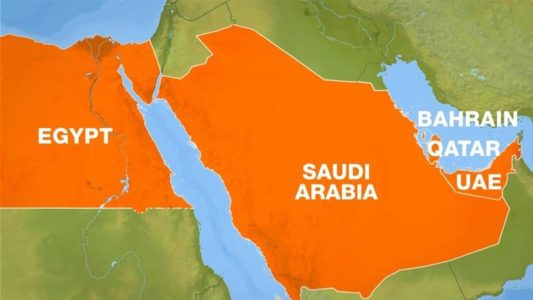 |
On Monday, Bahrain, Saudi Arabia, UAE, Yemen, and Egypt, followed by Libya and the Maldives, cut diplomatic ties with Qatar over what was described by Saudi officials as “protecting national security from terrorism and extremism.” Last month, Qatar’s state-run News Agency (QNA) broadcast Qatar’s Emir Sheikh Tamim bin Hamad Al Thani’s statements supporting Iran, Hamas, Hizballah and Israel, while suggesting President Trump may not last in power. Qatar’s foreign ministry dismissed the comments as a “shameful cybercrime,” and described the Arab countries’ decision as “unjustified and founded on baseless claims and allegations.” On Wednesday, Kuwait’s Emir Sheikh Sabah al-Ahmad Al-Sabah arrived in Qatar after visiting Saudi Arabia and the UAE this week, aiming to mediate and resolve the crisis. Comment: The U.S. president tweeted several times after his recent visit to Saudi Arabia expressing support for the Qatar isolation, causing many analysts to conjecture that the U.S. administration had a tacit or direct role in the diplomatic rift. Saudi Arabia also blamed Qatar for supporting and harboring the Muslim Brotherhood, the self-proclaimed Islamic State, and al-Qaeda, among other extremist groups. (Gulf News, Al-Ahram, Alarabiya1, 2, Aljazeera, BBC, France24)
Researched/Written by Atika Alkhallouf
|
|
|
|
|
|
AFGHANISTAN: Protests and peace talks after deadly bombing
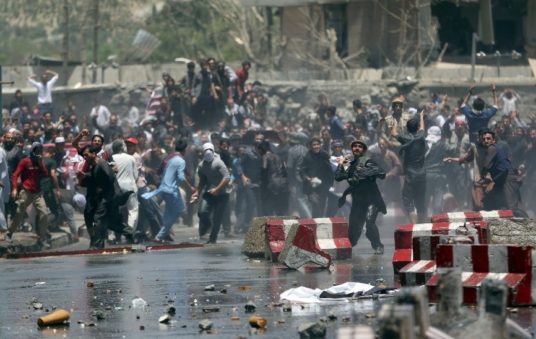 |
|
On Wednesday, a bomb placed in a water delivery tanker exploded in a diplomatic quarter in Kabul, killing 150 people and leaving hundreds wounded. On Friday, hundreds of protestors demanded the resignation of President Ashraf Ghani and his chief executive Abdullah Abdullah. Demonstrations began peacefully, but tensions escalated as the crowd grew; protestors clashed with police, resulting in at least four deaths and 15 wounded. Police utilized water cannons, tear gas and military vehicles to disperse the crowds. Ghani called for an international peace conference, “The Kabul Process”, including 26 nations this past Tuesday amid violent tensions. No one has claimed responsibility for the bombing, although intelligence officials blame the Taliban-affliated Haqqani network. Comment: The protests highlighted the anger towards the inability of Afghani government of ensuring public security as nearly three years have passed without international troops in the nation. (VOA, NYTimes, CNN, CBS)
|
|
|
|
|
|
INDIA: Farmers debt relief protests escalate after five protestors shot
On Wednesday, agitation escalated amongst striking farmers of Madya Pradesh after five farmers were shot and killed by police. Madhya Pradesh Chief Minister Shivraj Singh Chauhan blamed the opposition Congress party for inciting violence. Farmer discontent arose in both Madya Pradesh and Maharashta after Prime Minister Narendra Modi did not fulfill his promise to relieve farmers’ debt by doubling farmers’ income over the next five years. The protests began last week as farmers dumped vegetables and milk on the road while demanding debt relief. The price of produce doubled in these areas as a result. Comment: Two thirds of India’s 1.3 billion population depends on farming for their livelihood, but this sector only accounts for 14 percent of GDP. Official reports show more than 1,600 farmers committed suicide in 2015, due to crop failure or debt. (NY Daily News, AlJazeera, Reuters, BBC)
|
|
|
|
|
|
SRI LANKA: EU leaders condemn recent wave of hate crimes
On Thursday, a group of Sri-Lankan based international diplomats condemned recent increase in attacks against Muslims in Sri Lanka and urged Colombo to investigate and uphold minority rights and freedom of religion by bringing the perpetrators to justice. Over 20 attacks against Muslims have occurred since April 17, and rights groups and activists accuse the Sri Lankan police of failing to prevent the series of hate crimes. Many analysts point to the Body Bala Sena (BBS), an organization that believes the spread of Islam is a threat to Buddhism, as propagating these hate crimes, however, they deny any involvement. Comment: Roughly 10 percent of the Sri Lankan population is Muslim, while Buddhists comprise 70 percent. Activists warn against echoing anti-Muslim riots led by hardliner Buddhist groups in 2014. President Sirisena was elected in 2015 with the promise of protecting minorities. (ColomboPage, DailyMirror, Hindustan Times, Reuters)
Researched/Written by Rabia Uddin
|
|
|
 |
|